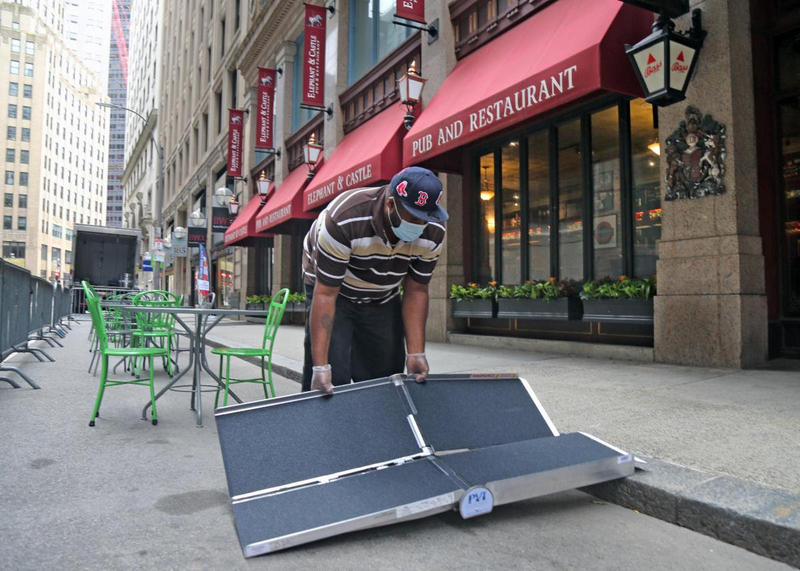New ramp initiative to highlight increased accessibility to outdoor dining
This initiative is made possible with support from Citi as part of the Empowered Cities Initiative, which is providing the City of Boston $200,000.
Mayor Martin J. Walsh announced a new ramp initiative to increase accessibility to outdoor dining amidst the COVID-19 public health emergency. Restaurants that have been granted a temporary license to have seating in a parking space or on the street are eligible to request a portable ramp.
"It's important that as we reimagine our streets to accommodate outdoor dining during our reopening process, we do so in a way that is equitable to everyone who uses our roads and sidewalks, including those with disabilities," said Mayor Walsh. "We are glad to include accessibility as an integral part of our permitting process, and thank the restaurants for welcoming the use of portable ramps in their spaces as they continue to safely reopen."
Since outdoor dining was permitted as part of the State's reopening plan, the Mayor's Commission for Persons with Disabilities has been working with the Licensing Board, the Boston Transportation Department and other City departments to ensure that new dining spaces are accessible and that the path of travel on sidewalks is not obstructed. Accessible Parking Spaces in the city remain available for those who need them.
"I'd like to remind everyone in the disability community that COVID-19 is still a risk throughout Boston, so if you decide to use the outdoor dining, please continue to take the necessary steps to protect yourself and others," said Mayor's Commission for Persons with Disabilities Commissioner Kristen McCosh. "Stay six feet away from others when possible, always wear a face covering, and wash your hands often."
Restaurants who have filed for outdoor seating can fill out the Portable Ramp Request Form to assess the need for a ramp. Ramps will be provided on a rolling basis, along with an accessibility toolkit that contains information on setting up the ramp, a laminated sign with information on accessibility that restaurants can hang up, and best practices on providing service to customers with disabilities. Ramps will be returned to the City at the end of the season and repurposed in other initiatives.
"We appreciate the City giving us outdoor space to welcome our guests back, and we're very excited to install our portable ramp to increase access to guests with disabilities," said Heather Lynch, partner of Black Lamb in the South End.
This initiative is made possible with support from Citi as part of the Empowered Cities Initiative which is providing the City of Boston $200,000. Remaining funds not used for the portable ramp initiative will be used for financial empowerment for people with disabilities.
The City has granted over 300 temporary extensions onto outdoor space to serve patrons. The Licensing Board is actively issuing approvals for temporary extensions on private and public property, and applications will continue to be reviewed and approved on a rolling basis. The Disabilities Commission is working with the Licensing Board to conduct outreach throughout Boston's neighborhoods to encourage restaurants to apply for this program, particularly women- and minority-owned businesses (WMBEs). Applications and guidance are available on Boston.gov.
The state building code, under the Massachusetts Architectural Access Board (AAB), requires restaurants to have an accessible route to tables. With seating now being extended onto the street, the City was granted a temporary MAAB variance that will allow all restaurants in Boston to use portable ramps in order to create an accessible route. This helped to reduce procedural and financial barriers for individual restaurant owners, and it will create accessibility for people of all ages and abilities.
As business owners, employers, and employees navigate an evolving reopening process and COVID-19-related assistance, the City of Boston created and maintains a "Reopening Boston" webpage, which includes industry-specific guidance and requirements, resources and tools, and more information on available City services. The City of Boston has created a number of useful guides and resources for small businesses impacted by COVID-19, including a new platform to advertise and purchase PPE and cleaning supplies, Open Businesses in Boston and Support Boston Restaurants, platforms which helped businesses to publicly share that they are open and direct residents to support local establishments. For all coronavirus updates from the City of Boston, please visit boston.gov/coronavirus.


